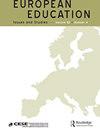Decolonizing “the University” in Europe: Theoretical and Methodological Implications of an Affective Assemblage Approach
IF 0.3
Q4 EDUCATION & EDUCATIONAL RESEARCH
引用次数: 0
Abstract
Abstract The purpose of this paper is to discuss the theoretical and methodological implications of an affective assemblage approach in the study and practice of decolonizing “the University” in Europe. In particular, the analysis aims to better account for the affective dimensions of decolonizing “the University” in Europe, taking into consideration that neither “the University” in Europe assumes a monolithic institution nor “decolonization” constitutes a monolithic project. Although the paper is theoretical, it provides examples of the meaning and function of decolonizing “the University” in various settings within the European higher education context. The paper contributes to the critical problematics of ongoing efforts to decolonize universities in Europe by exploring the prospects of affective assemblages as a working concept that helps education theorists, researchers, and policymakers in European higher education come to terms with both the intellectual and affective demands of decolonization processes.欧洲“大学”的非殖民化:情感组合方法的理论和方法含义
摘要:本文的目的是讨论情感集合方法在欧洲“大学”非殖民化研究和实践中的理论和方法意义。特别是,分析的目的是更好地说明欧洲“大学”非殖民化的影响方面,同时考虑到欧洲“大学”既不是一个单一的机构,“非殖民化”也不是一个单一的项目。虽然这篇论文是理论性的,但它提供了在欧洲高等教育背景下各种环境下非殖民化“大学”的意义和功能的例子。本文通过探索情感组合作为一个工作概念的前景,为欧洲大学非殖民化的持续努力做出了重要贡献,该概念有助于欧洲高等教育的教育理论家、研究人员和政策制定者接受非殖民化过程的智力和情感需求。
本文章由计算机程序翻译,如有差异,请以英文原文为准。
求助全文
约1分钟内获得全文
求助全文
来源期刊

European Education
EDUCATION & EDUCATIONAL RESEARCH-
CiteScore
1.20
自引率
0.00%
发文量
5
期刊介绍:
uropean Education is published in association with the Comparative Education Society in Europe (CESE). It is an international peer-reviewed journal devoted to original inquiries and dialogue on education across the member states of the Council of Europe. Established in 1969, the journal features articles on education in individual member states, comparative studies on education across Europe, as well as the impact of European education initiatives globally. The journal especially encourages theoretical and empirical studies, interdisciplinary perspectives, and critical examination of the impact of political, economic, and social forces on education. European Education includes reviews of books and educational films, including those published/produced in English and other languages.
 求助内容:
求助内容: 应助结果提醒方式:
应助结果提醒方式:


